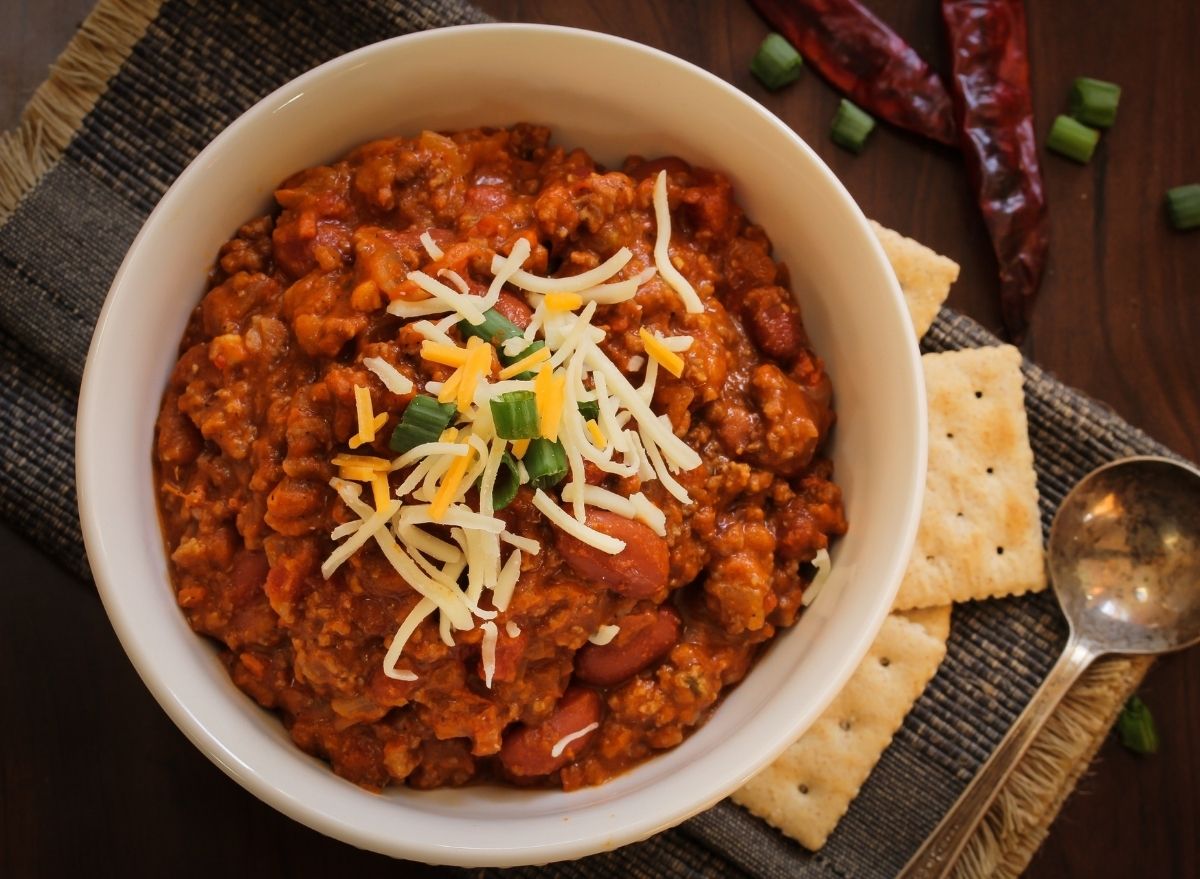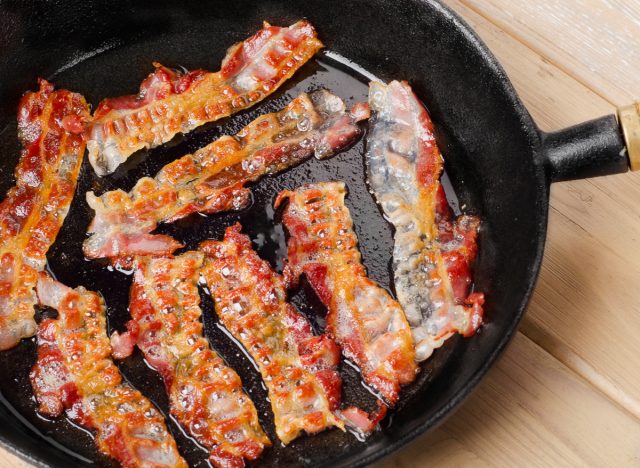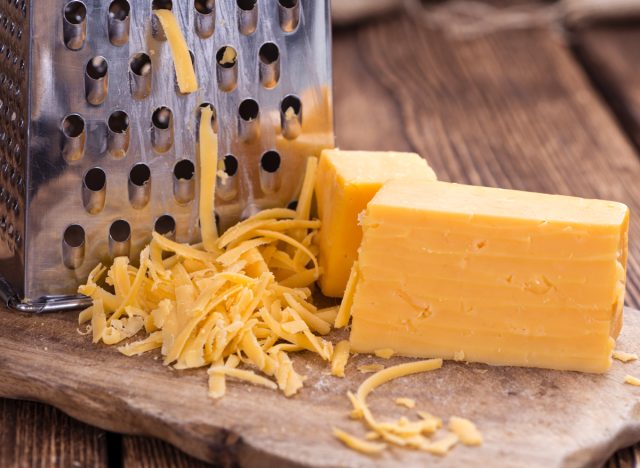5 Ingredients You Should Never Add to Chili

If you need to eat healthy but still want to enjoy a hearty meal, you can’t go wrong with chili.
“Chili is a relatively healthy dish when prepared with quality ingredients,” says Trista Best, MPH, RD, LD at Balance One Supplements. “Chili is often made with beans, ground meat (beef or poultry), peppers, onions, and a wide variety of other nutrient dense ingredients. A bowl of chili can be a well-balanced meal all by itself.”
On paper, chili can fit most diets, but some home cooks have found ways to take this unassuming dish to new caloric heights by loading it up with ingredients that are brimming with fat and salt. Trying to find the perfect balance between a delicious bowl of chili and a meal that won’t derail your health goals sounds tough, but with the right knowledge, you can avoid some major nutritional pitfalls.
Eat This, Not That! consulted a handful of registered dietitians to get the scoop on which chili ingredients you may want to avoid if you are sticking to a healthy eating plan. Ditching some of these add-ins might sound difficult, but it shouldn’t stop you from experimenting with new recipes. If you need some inspiration, try out one of these 20 Best Healthy Chili Recipes for Weight Loss, and you might even discover your next favorite take on this classic homestyle dish.
Crackers
If you need to add an extra crispy texture to your next bowl of chili, try not to reach for your favorite crackers. “Saltine crackers are a popular chili topping, but their sodium and refined carb content make them troubling in terms of nutrition,” says Best.
Saltines aren’t the only crackers to watch out for. “Oyster crackers are also commonly served with chili,” Best explains. “They are both heavily processed and made with refined carbs, which are essentially void of any vitamins or fiber. All the beneficial ingredients that are in whole grain crackers are missing from these forms, and in turn can have inflammatory properties.”
If you crave some extra crunch on top of your chili but don’t want to use crackers, you can try out a different kind of topping. “Tortilla chips and whole grain crackers are ideal substitutes for refined carb-based crackers,” Best says. “Finding low-sodium options of these alternatives will help to improve this concerning area as well. Otherwise, those wanting the crunch of crackers may enjoy sweet potatoes or jicama for added vitamins and minerals as well.”
Bacon

Bacon has come under fire for years due to its high saturated fat and salt content. It can easily overload any meal with fat, and chili is no exception.
“Bacon is high in saturated fat and also high in sodium,” says Olivia Sokolowska, MBA, RD at Salted Butter Kitchen. “Consider using turkey bacon, or adding smokiness in other ways with seasonings or charred vegetables.” If you need to watch your diet, skip the bacon crumbles next time you whip up a batch of chili.
Full-Fat Sour Cream
Even if you made a perfectly healthy pot of chili, you can easily undo some of the benefits by loading it up with less-than-wholesome toppings. Many folks out there love a solid dollop of sour cream to finish off each serving of chili, but this add-on can easily add way too many calories and grams of fat to your meal.
If you love some extra creaminess on top of this dish, don’t assume you can’t find a good substitute for sour cream. “Choose low-fat options or top with Greek yogurt,” Sokolowska recommends. “Low-fat sour cream typically has about 50% less fat than full-fat sour cream, helping to save calories while still helping you enjoy a classic chili topping. Swapping in a fat-free, plain Greek yogurt is great if you’re looking for an extra low-calorie option with a stronger flavor.”
Full-Fat Cheese

Full-fat dairy toppings promise to undo any of the hard work you spent trying to craft a healthy bowl of chili, and generous sprinkles of full-fat cheese on top of this dish can add in a ton of unnecessary nutrition. “Too much full-fat cheese will skyrocket the calories and saturated fat of the meal,” says Katie Tomaschko, MS, RDN, CDN, and contributor at Sporting Smiles.
“I would definitely recommend using a reduced-fat cheese if you are looking to make your chili healthier because the saturated fat content will be a lot lower. I would definitely not ax the cheese all together if that’s what you love, but just exercise moderation and mindfulness in adding it.”
If you do decide to top your chili off with some cheese, make sure this dairy product has some fat in it. “I would also not recommend fat-free cheeses because in my opinion, they truly taste like cardboard and do not melt well because of the low-fat content,” says Tomaschko. “In that instance, I would recommend skipping the cheese altogether.”
Store-Bought Spice and Salt Blends
Any good chili recipe features a ton of flavor. While many takes on this dish require you to create your own blend of spices and seasonings at home, others rely on store-bought seasoning blends.
You can typically adjust your homemade seasonings and keep the amount of salt low, but “Pre-made spices and seasoning blends may contribute to an unhealthy amount of sodium,” says Tomaschko. “This is because they are rather easy to ‘overdo.’” These spices can range all the way from garlic and onion salt, to pre-made Cajun seasoning or chili seasoning packets.
In order to keep the salt levels of your chili under control, skip this ingredient and opt to make your own spice blend. By taking matters into your own hands, you can supercharge your chili.








